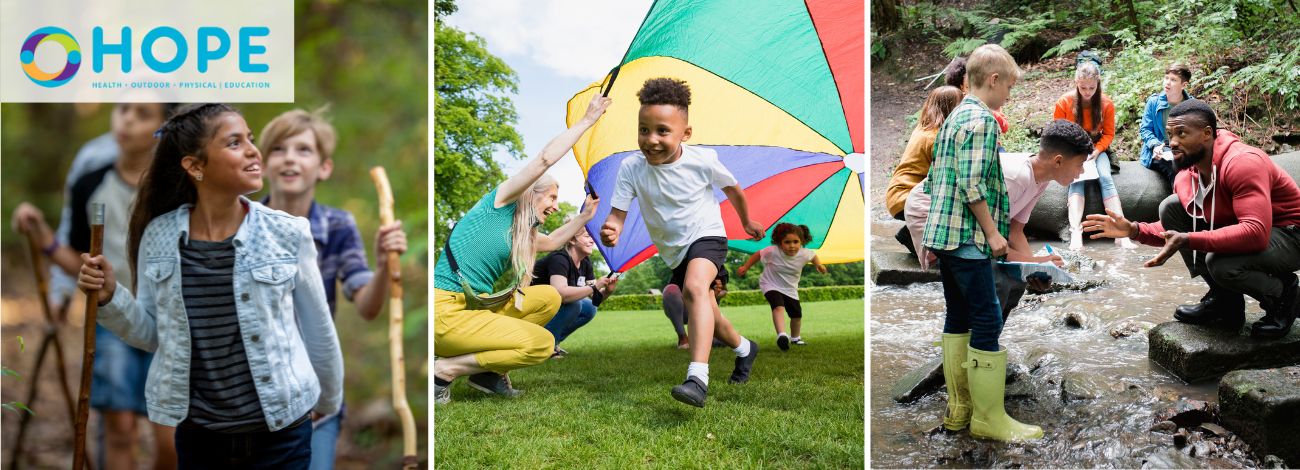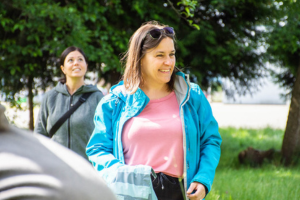
MEd in Curriculum Studies
Health, Outdoor, & Physical Experiential Education (HOPE)
The program has been designed to cater to the needs of professionals whose roles have an educational component and/or some educational responsibility.
The cohort’s core focus of experiential education provides a platform from which all cohort members may begin to explore philosophical connections amongst beliefs, intentions, actions, ontologies, epistemologies and methodologies that will be further developed in the other cohort courses. The program has been designed in a way that allows cohort members to develop depth in their specialist knowledge/area and breadth of understanding by engaging with a core course in another area.
With the program’s focus on experiential education and learning, participants will gain insight into facilitating opportunities for participation in and commitment to health, outdoor, and physical education. The potential for participants experiencing shared research is promising, not only in courses but also in the final project. There are rich and productive collaborations that occur within and between the fields of study, and these draw from faculty expertise and collaborations.
This program is offered by the Department of Curriculum & Pedagogy
Start Date: July 2025
Length: 2.5 years
Format: Blended (online & in-person)
Domestic Tuition: $16,716.70 CAD
International Tuition: $18,233.60 CAD
Upcoming Info Sessions
There are currently no info sessions scheduled for this program
Program Details
Program Areas
Health Education
The health education area offers a boutique of courses that invite those enrolled to engage in timely and relevant conversations about the complexities of doing ‘health education’. Framed within constructivist perspectives, participants will be asked to interrogate societal shifts in health education.
The social determinants of health will be considered, including an examination of how the intersection of gender, race, sexuality, social class, nationhood and age shape health status. The pedagogical approaches used in this course will be inquiry based and highlight a criticality that can enliven health education moving it beyond a behaviourist approach, while avoiding thinking of health in binary terms (e.g., fit/unfit, healthy/unhealthy or obese/normal).
Outdoor Education
The inherently interdisciplinary outdoor learning setting invites educators to (re)consider curricular and pedagogical approaches and methodologies beyond classroom walls and school confines.
The outdoor learning courses explore themes such as: experiential learning, environmental education, indigenous principles of learning, local learning, place-based learning, socio-emotional learning, STEM, sustainability, and holistic wellbeing through critical and emancipatory lenses. The Outdoor Education area welcomes formal and in/non-formal educators interested in increasing time spent outdoors in their practice.
Physical Education
The three physical education courses are designed for physical educators who are ready to move up a gear by refining and expanding their ideas of teaching, learning and knowing.
Using some of the innovations in PE such as Teaching Games for Understanding (TGfU), Inventing Games, Physical Literacy, and Sport Education as a catalyst for thinking about ontological and epistemological issues in PE, teachers will start to explore experiential, constructivist, student-centred and holistic approaches for their own practice.
Schedule
2024 Cohort Schedule
| Year 1 | Year 2 |
|---|---|
|
Summer Term 2a (In person from July 8-July 19, 2024)
|
Summer Term 1
Summer Term 2a
|
|
Winter Term 1
|
Winter Term 1
|
|
Winter Term 2
|
Winter Term 2 & Summer Term 1
|
Core Courses by Area
Health Education
- Approaches to Health Education, EDCP 325
- Seminar in School Health Education, EDCP 534
- Seminar in Curriculum and Pedagogy: Researching Health for Social Justice, EDCP 585
Outdoor Education
- Health Promotion, Wellness and Life Skills in Outdoor Settings, EDCP 531
- Theories and Dimensions of Place-Based Learning: Ecohumanist, Critical & Indigenous Lenses, EDCP 532
- Explorations in Curriculum and Pedagogy for Local Outdoor Learning, EDCP 423
Physical Education
- Curriculum Innovations in Physical Education, EDCP 530
- Seminar in Curriculum and Pedagogy: Physical Education – Early Year (K-7), EDCP 533
- Seminar in Curriculum & Pedagogy: Physical Education – Beyond Early Years (8-12), EDCP 585
Requirements
All students must meet the admission and application requirements of both the Faculty of Graduate Studies and the program, which include:
- Normally two years’ teaching experience, practice and/or other relevant professional experience.
- A 4-year undergraduate degree with an average in the B+ range (76% at UBC) in all senior-level courses.
- A resumé/CV.
- A 600-word statement of intent clearly outlining your experiences and interests in Health, Outdoor, & Physical Experiential Education (HOPE-Ed) program. Specify your interest in one of the three program areas and outline how the specialization in Curriculum Studies supports your professional goals.
- Statements of support from three referees who can speak to your engagement with Health, Outdoor, & Physical Experiential Education (HOPE-Ed), teaching or other relevant professional experience including, whenever possible, professors familiar with your academic work.
Fees
| Type | Per Installment | Total Tuition |
|---|---|---|
| Domestic | $2,388.10 | $16,716.70 CAD |
| International | $18,068.61 | $18,233.60 CAD |
Graduate tuition is assessed as an annual program fee, which is divided into three equal installments due at the beginning of academic terms starting in September, January and May.
Students in this program will pay a minimum of 7 installments.
Student Fees
Student fees include fees established and authorized by the UBC Board of Governors and fees established and authorized by students societies. These fees are in addition to tuition fees. Please see the UBC Calendar for details on student fees.
Fees are subject to change annually. Only information in the UBC Calendar is official
Funding Eligibility
As this program is part-time, it is not eligible for student loans or other types of funding.
How to Apply
Application Status: Closed
Application Deadline: TBD
Document Deadline: TBD
1. ONLINE APPLICATION
- Navigate to grad.ubc.ca/apply/online/.
- When you are ready to apply, click “Apply Online”.
- Read the instructions, and either log in with your CWL or create a CWL if you have never attended UBC.
- Once logged in, on the “Degree Program Selection,” type the 4-character cohort designation HOP3 orMEd in Curriculum Studies – Professional Cohort into the “Program Keyword” field.
- Click the program name. Ensure you select the version that ends with “Professional Cohort”.
- Click the “Apply” button.
- Fill out the application as indicated.
2. SUPPORTING DOCUMENTS
Please have these ready to upload when you apply:
- Official transcripts
- References
- Statement of intent
- Résumé
- English proficiency report (if applicable)
References:
Referees may be academic or professional. Academic references are those who know you in an academic capacity (e.g. former professors). Professional references MUST be those who have supervised you in a work setting (e.g. Principal, Vice-Principal, or other non-educational supervisor).
Please encourage your referees to submit electronic reference forms. In cases where referees are unable to submit an electronic reference, sealed and endorsed reference letters or reference forms may be sent by mail.
Once you submit and pay for your online application, your referees will automatically receive an email with a link and instructions for completing the electronic reference form, or the link to the paper reference form.
A reference letter can take the place of the reference form as long as it addresses the questions posed in the reference form.
![]() Important: Please ask your references to include the 4-character cohort designation HOP3 when they submit their reference. All references must arrive in sealed envelopes with the reference’s signature on the seal.
Important: Please ask your references to include the 4-character cohort designation HOP3 when they submit their reference. All references must arrive in sealed envelopes with the reference’s signature on the seal.
For those choosing to submit paper references, please send to:
HOP3 Graduate Cohort
Professional Development & Community Engagement
UBC Faculty of Education
1304-2125 Main Mall
Vancouver, BC, Canada
V6T 1Z4
3. APPLICATION TIMELINE
After your application is submitted, all documents are uploaded, and references have been received, your application file is considered complete.
Once the application deadline for the program has passed, all completed application files are submitted to the Department for review. Applications recommended by the Department for admission are then confirmed against Graduate & Post-Doctoral Studies requirements, and accepted applicants are notified. Any special case admissions require an additional review by Graduate and Post-Doctoral Studies.
The entire process generally takes 8 to 12 weeks.
NOTE:
This program is subject to minimum enrollment in order to run. We will advise applicants on the status of this program after the application deadline has passed.
4. ASSISTANCE
If you require any assistance with the application process, please contact:
Kelvin Mok
Senior Program Assistant
604-827-5662
pdce.educ@ubc.ca
Info Sessions
Meet the Program Advisor and Senior Program Assistant, and learn more about applying to become a UBC graduate student.
There are currently no info sessions scheduled for this program
Did you miss one of our info sessions?
Watch a recorded info session from November 1, 2023

Jackie Hamnett, Teacher at Birchland Elementary
2021 graduate
“The benefit [of the MEd in HOPE] is that now when I take the students outside, I know that there’s a lot of research to prove that what we’re doing is beneficial. We’re not just going outside to ‘play’. There’s so much that I can do outside that covers the curriculum.”
Read more about how our program has helped Jackie learn, grow and excel as an educator.
Contacts
For program content questions:
Dr. Shawn Forde
Program Coordinator, HOPE
Dept. of Curriculum & Pedagogy
shawn.forde@ubc.ca
For application questions or assistance:
Kelvin Mok
Senior Program Assistant
604-827-5662
pdce.educ@ubc.ca